
USA for IOM Appoints New CEO to Lead Next Chapter of Humanitarian Innovation

Geneva/Washington, D.C., 17 June 2025 – USA for IOM, the U.S. nonprofit partner of the United Nations’ International Organization for Migration (IOM), today announced the appointment of Joanna Wasmuth as its new Chief Executive Officer. Wasmuth is a visionary leader with extensive expertise in international development and economic empowerment, and a strong track record of building high-impact partnerships to support displaced communities worldwide.
At a time when record levels of displacement are straining global resources, Wasmuth will lead USA for IOM into a new chapter of cross-sector collaboration. Under her leadership, the organization will enhance partnerships that support IOM programming to save lives and advance durable solutions to displacement.
“Joanna brings a blend of courage and creativity to her leadership, and her strategic vision and relentless drive for innovation have set new standards,” said IOM Director General Amy Pope. “We look forward to seeing USA for IOM flourish under her stewardship, as we build groundbreaking partnerships and unlock new opportunities that broaden support for our work around the world.”
From supporting survivors of trafficking to helping conflict-affected families rebuild their homes, USA for IOM connects private donors, corporations, and foundations with life-changing projects led by IOM’s global teams. These collaborations are transformative investments, blending private sector innovation with humanitarian expertise to expand possibilities for vulnerable people around the world.
“I am honored to lead USA for IOM at this critical time and to work alongside our board, partners, donors, innovators, and communities to build solutions that empower people on the move,” Wasmuth said. “We look forward to growing our partnerships with the private sector to create scalable, sustainable solutions that shape brighter futures for displaced families worldwide.”
Wasmuth has more than 25 years of experience in international development and nonprofit leadership at organizations such as World Vision and Vision Fund International. She has championed partnerships and funding innovations that have strengthened vulnerable populations and developed critical solutions to combat human trafficking.
“On behalf of the Board, we are thrilled to welcome Joanna,” said Anne Richard, USA for IOM Board member, former U.S. Assistant Secretary of State, and NGO leader. “She has experience building support for worthwhile causes, and we are happy she will be putting her considerable talents and enthusiastic energy to use in support of USA for IOM.”
For more than 30 years, USA for IOM has mobilized funding for a wide range of IOM’s more than 170 country missions – helping conflict-affected communities in Ukraine, protecting extremely vulnerable migrants in Africa and South America, and assisting victims of human trafficking around the world.
About USA for IOM
USA for IOM is the nonprofit partner in the U.S. of the International Organization for Migration (IOM). USA for IOM raises awareness and mobilizes support for humanitarian assistance and development initiatives to improve the lives of displaced people around the world. Join us in creating lasting solutions that empower displaced communities and generate sustainable impact.
To request a meeting with Joanna Wasmuth to discuss partnerships, please email: collaborate@usaforiom.org.

DHL Group, Wine To Water, and IOM Deliver Water Filters to Flood Affected Communities in Kenya

Community session in Tana River County on water filter use supports clean water access for families affected by flooding. Photo: IOM Kenya 2024/ Charlotte Ann Kataka.
In the wake of devastating floods that displaced more than 400,000 people in mid-2024, ongoing heavy rains have continued to jeopardize access to clean drinking water in several regions of Kenya. With the health and well-being of thousands at risk, swift humanitarian action was and continues to be necessary. Outreach to partners is key to accompany IOM’s comprehensive assistance in collaboration with the Government of Kenya.
In response, a collaborative effort between DHL Group, Wine To Water (WTW), and IOM Kenya, with support from USA for IOM, mobilized to provide clean water solutions to affected communities. Through this partnership, 1,000 high-quality water filters were delivered and distributed, ensuring families have access to safe drinking water.
A personal note from Wine To Water for water filter recipients. Photo: IOM Kenya >

Initial steps:
- – Wine To Water (WTW), a global non-profit preserving life and dignity through the power of clean water, offered and packaged the 1,000 hollow fiber membrane water filters in the U.S. to prepare for delivery, and provided in-person training to IOM Kenya;
- – DHL Group provided ground expertise.
- – IOM Kenya procured 1,000 buckets to accompany the water filters; staff coordinated with communities to prioritize areas and families with the most pressing needs, and to arrange sensitization sessions and plan distributions;
- – DHL’s GoHelp Disaster Response Team drilled holes in each bucket to fit the filters, ensuring easy and efficient water filtration.

DHL GoHelp Disaster Response Team members prepare buckets for water filters. Photo: IOM Kenya 2024 / Grace Kae.




DHL Disaster Response Teams members demonstrate use of the bucket and water filter to produce clean water. Photo: IOM Kenya 2024/ Grace Kae.
Despite heavy rains in Tana River County making many roads impassable, and security challenges in some areas, DHL Group’s logistics expertise ensured the successful delivery of the 1,000 filters and buckets. As the world’s leading logistics company, DHL Group provided ground expertise. Distributions were completed by 1 December 2024.
The deliveries involved traversing more than 2,000 km to reach 15 destinations in one of the most flood-affected areas of the country; Garsen South and Garsen West, within Tana River County.


DHL Disaster Response Teams members demonstrate use of the bucket and water filter to produce clean water. Photo: IOM Kenya 2024/ Grace Kae.

Wine To Water provided training to IOM teams, who further disseminated guidance to households receiving water filters. Photos: IOM Kenya / Moses Otunga.
Empowering Communities for Lasting Impact
To ensure long-term benefits, Wine To Water offered training sessions for IOM Kenya staff and local teams, focusing on the proper use and maintenance of the filters.
Community sensitization sessions were held to educate families on the importance of safe drinking water and the effective use of the new filtration systems.


Sensitization on use of water filter with a community member in Garsen West. Photo: IOM Kenya 2024 / Charlotte Ann Kataka.
A Life-Changing Impact
With the distribution of 1,000 filters, approximately 6,000 people now have improved access to clean water. Community members expressed appreciation for the life-saving intervention:

Esha Halako Abae uses a water filter to clean water. Photo: Madina Gwiye Said.
“We use river water for our daily needs, though the river water is dirty. When we drink the water it affects us and harm us; the children get diarrhea, and the adults also. Sometimes we suffer from cholera and other diseases,” said Esha Halako Abae, a farmer from Garsen.
“But since we received these little filters and buckets things have improved. When people drink the filtered water, we are prevented from getting sick. Now we are living well, our children and our families. As residents we are happy with the tool we received.”

Mzaham Ali Islam and his 32 family members and his neighbors now use the water filter to clean their water. Photo: Madina Gwiye Said.
“We rely entirely on water from the Tana River, for drinking, cooking, and household needs, but the water is often dirty. When the river floods the water becomes even dirtier,” said Mzaham Ali Islam, a community leader from Garsen West Ward.
“When I fetch water from the river and pour it into the filter, it comes out crystal clear, cleaner than Mount Kilimanjaro’s water. It is safe and satisfying to drink. Since receiving this water filter, I have felt great relief. It has brought comfort to my family, eliminating the struggle of searching for clean water, and water treatment chemicals. This initiative has saved us from many waterborne diseases. I truly love this filter.”
IOM Kenya and USA for IOM also acknowledged the impact of this collaboration:
“We deeply appreciate the DHL Group’s support in ensuring the secure delivery of this critical aid, and Wine To Water’s generous contribution of water filters. This partnership exemplifies the power of collaboration in responding to humanitarian crises,” said Sharif Faisal, Head of Programmes, IOM Kenya.
“Access to clean water is a fundamental necessity, and this collaboration demonstrates how strategic partnerships can make a life-changing impact for communities in crisis. We are grateful to DHL Group and Wine To Water for their commitment to ensuring that families affected by the devastating floods in Kenya receive the support they need. USA for IOM is proud to stand alongside our partners in delivering sustainable solutions that promote health, dignity, and resilience.” said Luciano Arroio, Interim CEO of USA for IOM.
Expanding Humanitarian Logistics for Future Response
This successful initiative underscores a broader commitment between IOM and DHL Group, who recently announced a global partnership agreement aimed at strengthening humanitarian logistics and relief efforts worldwide. By leveraging expertise in logistics and humanitarian response, both organizations are committed to expanding their reach and improving emergency aid delivery for communities in crisis.

Delivery of Emergency Supplies Supports Flood Response in Kenya: IOM and UPS Foundation Partnership

UPS trucks depart from Nairobi on their way to deliver relief kits to families affected by floods. Photo: IOM Kenya, 2024.
Heavy rains in early and mid 2024 in Kenya resulted in devastating floods that displaced more than 400,000 people, washing away homes and livelihoods. Major infrastructure including roads and bridges were also severely damaged. Nearly 5,000 livestock deaths were reported, and close to 30,000 acres of farmland destroyed. Many of the affected families had just come through droughts; the floods were yet another weather-related disaster testing their resilience and survival.
“Water levels have never been this high. Now we have no houses, no toilets, and no food. Important legal documents, such as our identification cards, title deeds and academic certificates have all been washed away,” said Mohamud Omar, Community Leader and Chairman of Bula Kamor Area, Garissa, one of the communities worst affected by floods that devastated several areas of Kenya.

“The recent floods swept away my crops, livestock, and uprooted my home,” said John Olang, a small-scale farmer from Homa Bay County, standing in his recently re-planted field. Photo: IOM/Moses Otunga, 2024.
Preparation for relief kit distributions
Following needs assessments and coordination with national and county government authorities, heavily affected areas were identified for urgent humanitarian response. In addition to central Kenya, these included the counties of Mandera and Garissa in the eastern region; Kilifi and Tana River on the coastal region, and Homa Bay in the far western region.
In line with wider response plans, as part of comprehensive recovery support efforts, the International Organization for Migration (IOM) in Kenya prepared thousands of non-food item kits for distribution. The relief kits included items tailored for flood response: tarpaulins to support emergency shelters, bar soaps, kitchen sets, mosquito nets, solar lamps, buckets, jerry cans, sleeping mats, blankets, and ‘lessos’ – swathes of patterned fabric.
USA for IOM, IOM’s non-profit partner in the United States, accepted the offer of in-kind transportation and logistics support from the UPS Foundation to deliver emergency supplies to thousands of families affected by flooding in Kenya.
Counties of distribution of IOM relief kits delivered by UPS Foundation in response to 2024 floods in Kenya.>

Logistical challenges
With more than 3.8 metric tons of relief supplies in the capital of Nairobi due for distribution, logistics would be daunting, with destinations between 400 km and 900 km away, across flood-affected areas, where severe damage to roads and bridges affected traffic routes. The distance between the distribution sites in some counties were also far apart and designating a central point for the beneficiaries was a challenge.
Through the UPS Foundation donation and their partner G4S, 17 trucks traversed more than 3,000 kilometers in total, reaching five counties. The distributions delivered relief kits to 4,200 families, for a total of 25,201 lives impacted (12,348 male and 12,853 female). The distributions were carried out in collaboration with implementing partners Kenya Red Cross and World Vision Kenya.
Overall, IOM Kenya’s flood response in 2024 in collaboration with partners reached 100,000 individuals. Distributions were carried out in coordination with local authorities, to support the most affected households. These included women headed households, and those who had lost their livelihoods.
“It was raining heavily; the rain and flood soaked our beds. We are afraid for our children, we have nowhere to take them. It rained again yesterday. We have no place to put our belongings, so we sleep on wet ground. I am grateful today for this distribution. Thank you, it was sincerely needed,” said Nadia, a mother from Tana River.

Distribution of relief kits to individuals heavily affected by the floods in Homa Bay, Kenya. Photo: IOM/ Moses Otunga, 2024.
Collaborative efforts
The UPS Foundation joined IOM in Nairobi for the departure of several trucks.
“We flagged off the trucks, heading to Tana River; other trucks will soon go to other counties, in partnership with IOM, to deliver relief items to those who are affected by the floods. Now while the floods have left the headlines, sometimes we forget that the people who have been affected are still experiencing the same impact on their lives,” said Caroline Kiunga, Global Humanitarian Relief Director, UPS Foundation.
“Today we are dispatching another round of shipments to flood affected families. We are delighted to partner with the UPS Foundation in IOM’s response to the ongoing floods in Kenya,” said Sharif Faisal, Head of Programs at IOM Kenya. “This partnership with the UPS Foundation is part of our approach to increase partnership with all stakeholders, including the private sector.”

IOM Kenya and the UPS Foundation flag off trucks for the delivery of relief kits to flood-affected communities. Photo: IOM Kenya, 2024.
“The devastating floods in Kenya remind us of the urgent need for swift, coordinated action to support affected families. USA for IOM is honored to partner with the UPS Foundation in this critical humanitarian response, leveraging their logistical expertise to ensure that essential relief supplies reach communities in need,” said Luciano Arroio, CEO a.i. of USA for IOM. “This collaboration embodies the power of partnerships in addressing the complex challenges posed by climate-related disaster.”

Supporting Ukrainians’ Resilience and Recovery in Toronto
Supporting Ukrainians’ Resilience and Recovery in Toronto

The Ukrainian Pop-Up Shop in Toronto.
A Ukrainian Pop-Up Shop launched in Toronto with the support from the International Organization for Migration (IOM) is delighting scores of holiday visitors, and helping to support economic recovery in Ukraine. The shop features the art and products of over 50 Ukrainian artists and craftspeople, including small businesses launched by veterans and those from war-affected regions of Ukraine where shelling is an everyday occurrence.
Kateryna Kliui creates handmade “motanka” dolls that are traditional family amulets in Ukraine. “I live close to the (Russian) border in Chernihiv region. If something happens to my home, my dolls will be preserved in Canada.”
The Pop-Up Shop is not only promoting the handmade crafts of talented artisans but also showcasing Ukrainian art and culture. Tetiana Protcheva is a master embroider from Kyiv, who is known for her innovative designs combining traditional Ukrainian embroidery and modern technological elements like QR codes to promote deeper understanding of Ukrainian culture and history.
Motanka dolls at the Ukrainian Pop-Up Shop ->

“It is extremely important to show how creative Ukrainian people are and help them promote their business,” said Tetiana. The launch of the Pop-Up Shop in September 2024 coincided with the largest Ukrainian festival in North America, which promotes Ukrainian culture and brings in over 1 million visitors annually.
“I really admire the resilience of our artists,” said Oleh Nikolenko, the Consul General of Ukraine in Toronto. “At a time when Ukraine is being bombed daily, people who don’t have necessary electricity or basic services continue to create and produce high quality goods and products.”




Handmade crafts from the Ukrainian Pop-Up Shop.
Oleh is one of the primary organizers of the Pop-Up Shop. He explained how the project comes at a time when Ukraine is continuing to face Russian invasion, with the past almost three years of war having done extensive damage to Ukraine’s exports and overall economy. Facilitating the export of small businesses’ goods aims to help create new export channels for Ukraine and contribute to its long-term recovery.
The Pop-Up Shop participants were organized by NAZOVNI.Online, an economic diplomacy platform affiliated with the Ministry of Foreign Affairs of Ukraine. In partnership with IOM, NAZOVNI.Online coordinated with Meest Canada the shipping of the participants’ wares. So far, 45 containers with the products have been shipped from Ukraine to Canada.


Handmade crafts from the Ukrainian Pop-Up Shop.
Additionally, IOM facilitated the shop’s social media marketing to boost sales and spread the word about this unique Ukrainian place in Toronto. “The Pop-Up Shop gives an opportunity for Ukrainian small businesses to introduce their goods outside of Ukraine,” said Oleksandra Sologub, Operational Director of NAZOVNI.Online. “The situation right now is not easy. Even with the power cuts and everything the businesses are running. They’re trying to stabilize, they’re trying to give [places of work] to people.”
The organizers are enthusiastic about the initiative, and for Canadians and other visitors to the shop to discover what Ukrainians can create. The Pop-Up Shop is currently available for in-person shopping at 3015 Winston Churchill Boulevard, Unit 5, in Mississauga, Ontario, Canada. It is open Tuesday through Saturday from 10am to 7pm.
The initiative is additionally funded through USA for IOM and supported by IOM United States and the Canada-Ukraine Chamber of Commerce. For more information about the Ukrainian Pop-Up Shop, please contact Mariia Dakhym at +1 (437) 299-3643 or visit the shop’s Facebook page.


Youth film The Other Planet receives USA for IOM recognition in PLURAL+ competition
The film The Other Planet, developed by a group of 10 children in Belgium, received the USA for IOM recognition as part of the PLURAL+ Youth Video Festival on Migration, Diversity & Social Inclusion. The five-minute film tells the touching story of extraterrestrials – a mother and daughter – displaced by an attack on their Red Planet, who make their way to the Blue Planet, and their first awkward and then accepting interactions with residents.

The Other Planet film poster. Credit: Camera-etc.
“We had the chance to make a short film and we learned so many things about animation cinema and about why people sometimes have to leave their country. I think this movie is going to help us to be more open and understanding with other people,” said Binta, 11 years old.
The 6th grade students, aged 11-12 years old from Morchamps Municipal Primary School in Seraing, Liège Province, Belgium, used cut out technique to create the characters, sets and animation, developed the script, and recorded their own voices for audio.
Photos of the children working on developing The Other Planet film.
The film is produced by Camera-etc, an animation studio and creativity center from the Walloon-Brussels Community that produces art films, offering workshops to create animation shorts with the help of professionals. Camera-etc partnered with CRIPEL, the Liège Regional Centre for Integrating Persons of Immigrant Origin in Belgium, to carry out a project on the theme of racism. The Other Planet is used by CRIPEL as an awareness tool among young audiences.
“Since 1979, we have met thousands of young filmmakers during our animation workshop. Children and teenagers have a lot of ideas and we invite them to express themselves through animation. Making an animated short is a real team work with a lot of learnings, fun and creativity,” said Bastien Martin, producer from Camera-etc.
“We thank PLURAL+ and all the mentors for this recognition, it’s an honor to be part of this festival with our short films. And most of all, congratulations to the young filmmakers of The Other Planet !”



USA for IOM recognized The Other Planet for the film’s thoughtful portrayal of the situation and challenges faced by displaced people, and realizes the film’s potential for awareness raising. With congratulations to the 10 children: Adam, Berfin, Binta, Aaron, Naïla, Luca, Younes, Salif, Shanysse, Flavie, and to Delphine Hermans and Siona Vidakovic for their direction.
About PLURAL+
The primary goal of the PLURAL+ Youth Video Festival is to support the creative vision of young people and the global distribution of youth-produced media on themes related to migration, diversity, social inclusion, and the prevention of xenophobia in order to foster respect for cultural diversity. Launched in 2009, PLURAL+ is a joint initiative of the United Nations Alliance of Civilizations (UNAOC) and the International Organization for Migration (IOM), with a network of more than 50 partner organizations around the globe.


Global Migration Film Festival opens at IOM Mexico
Global Migration Film Festival opens at IOM Mexico

Speakers at the opening of the GMFF in Mexico City, November 7, 2024.
The opening event of the 2024 Global Migration Film Festival (GMFF), hosted by IOM Mexico, was held in Mexico City last week, attended by local representatives, private sector partners, and community members.
The feature film, A Million Miles Away highlighted the story of Jose Hernandez, who through determination from a young age as a Mexican American farm worker, fulfilled his dream to become a NASA Astronaut.
The film’s Director Alejandra Marquez Abella spoke on a panel on the impact of migrant talent contributing to the development of communities of destination and origin.
“It was very important for me to see one of the interviews Jose Hernandez gave from the ship. He said, ‘From space you can’t see borders’,” said Alejandra Marquez Abella. “That phrase inspired me to shoot the film.”

The GMFF in Mexico is supported by 25 entities: universities; government partners; private sector; and film, cultural and development organizations.
“Film plays an important role in USA for IOM’s mission. Through the stories presented at GMFF, we reach a diverse audience—ranging from the general public to key players in the private sector, as well as institutions and, of course, migrants themselves. These films allow us to see the reality migrants face on a daily basis, they’re challenges and resilience, not merely as numbers or data, but as individuals with their own stories—stories that could very well be our own,” said Luciano Arroio, Interim CEO of USA for IOM.

Multiple speakers highlighted the contributions of migrants to innovation, arts and sciences, successful companies, and work force dynamism.
“With this event begins the seventh edition of this festival in Mexico in which we want to bring you closer to extraordinary, inspiring and necessary stories to help us understand that those who migrate are not a threat, but that they make significant contributions to the communities that welcome them,” said Dana Graber Ladek, IOM Mexico Chief of Mission.

Dana Graber Ladek, Chief of Mission, IOM Mexico, and Luciano Arroio, Interim CEO, USA for IOM.
The GMFF in Mexico highlights films that share the unique contributions that migrants make to their host communities. Launched by IOM, the GMFF began in 2016 and has been held in more than 100 countries around the world. Films bring the stories of migrants to diverse audiences, with the aim to create space for respectful discussion and engagement.




A total of 25 film screenings on various migration experiences will be take place from November 7 to 28, across nine cities, including Tijuana, Ciudad Juárez, Mexicali, Monterrey, Guadalajara, Villahermosa, Tapachula, to be hosted in in shelters, cultural and university spaces, AVES Community Centers and theaters. The functions are completely free.
As in 2023, a special function will again take place in El Paso, Texas, USA at the Rubin Center, located in the University of Texas (UTEP), United States on November 21.
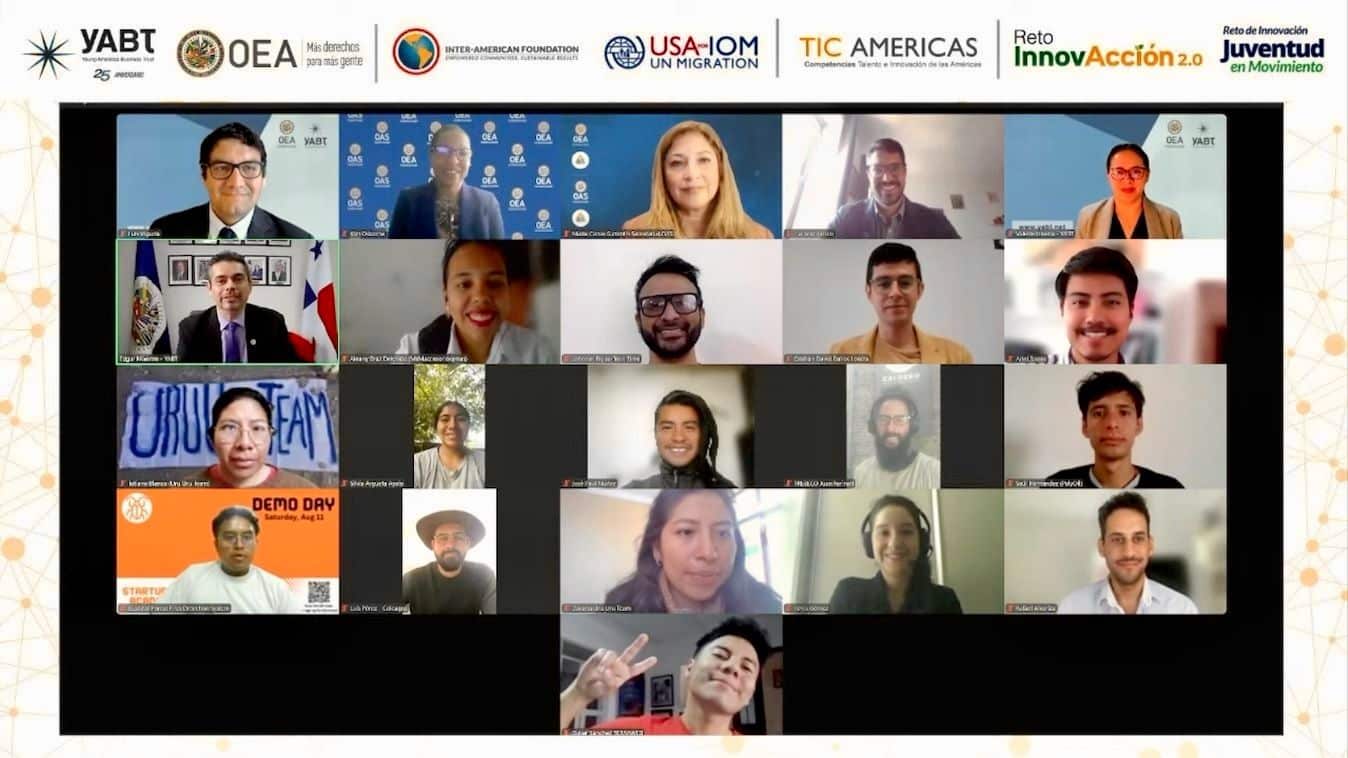
- admin
Regional Youth on the Move Innovation Competition Benefits Migrants and Host Communities in the Americas

Speakers and young entrepreneur finalists of the Youth on the Move and InnovAction Challenge 2.0, during the opening of the Talent and Innovation Competitions of the Americas, held on International Youth Day, August 12, 2024
Finalists of the “Youth on the Move” Innovation Challenge, in Ecuador and Peru, shared the positive impact of their business ventures during the Talent and Innovation Competition Americas 2024. During the live on-line event, finalists expanded upon their pitches in competition for seed capital and further mentoring and support.
The 2024 challenge, which offered start-up and business mentoring and training to hundreds of participants, concluded with a final event held on August 12-13 in commemoration of International Youth Day. The event included expert speakers on sustainability, climate resilience, entrepreneurship and digital transformation.
The Youth on the Move Innovation Challenge is designed to accelerate innovative ideas and new business models that facilitate the socioeconomic integration of migrants. The challenge supports young migrant entrepreneurs to strengthen their businesses and positively impact their communities. The focus is on the integration of Venezuelan migrants residing in Ecuador, Peru and the Dominican Republic.

The competition, organized by Young Americas Business Trust (YABT/OAS), is supported by USA for IOM and the Citi Foundation.
With nearly 700 start-up business submissions from Ecuador, Peru and Dominican Republic, selection of the finalists was highly competitive.
Finalists received $500 USD in-kind support, one month of mentoring, strategic local and regional connections to support their growth, and participation in YABT trainings and events. Together with these benefits, the winner received $2,500 USD seed capital, in-kind support of $1,500, further focused mentoring in the next steps of entrepreneurship, and visibility and follow-up support from YABT.
The finalist businesses included:

Founders of ECOSOS, Gian Walter Arbañil and Ángela Morales engage in sustainable vertical agriculture that empowers Venezuelan migrants and nourishes communities. ECOSOS innovates in food production with aeroponic crops, recirculating irrigation, thereby reducing water usage and eliminating pesticides.
It offers organic, nutritious and chemical-free foods and promotes sustainable business models that integrate Venezuelan migrants through training in agricultural techniques, promoting sustainable business models, benefitting food security and the environment.
Created by Aleany Diaz, MsM Accesories y Más (accessories and more) in Peru is a company that takes responsibility for each accessory they produce. All products are made by hand with hypo-allergic material for any type of body pH, which allows greater durability and lifetime for each piece. The company aims to contribute to the health and well-being of its customers and aims to prioritize socioeconomic integration.


Winner – Tesis Time (Ecuador)
Johnniel Rojas, winner of the Youth on the Move Innovation Challenge, a Venezuelan living in Ecuador, started Tesis Time, Transforming thesis creation around the world. The endeavor aims to improve people’s living conditions by supporting their professional and personal development and their societies, through education and access to employment.
“I came up with the idea to develop an app to learn scientific investigation methodology. We launched the app in Ecuador and later realized this was an issue for people all over Latin America. Our app has been downloaded over 40,000 times in different countries in Latin America. 35,000 students have used our learning methodology, and we’ve helped them graduate and accelerate their degree process, improving their insertion in the job market. Currently, 3,000 students use the app each month. There are over 3,000 hours of content.”
Johnniel explained the concept behind the app: “I was always a slow learner. My mother had a very creative way of helping me study, we would paint, sing, or draw to learn and study. Once I was in college, facing the scientific investigation methodology, I found myself going back to my mother’s empirical methods to be able to understand. This is the base for the teaching methodology of Tesis Time.“
“After launching the app we realized that most of the users were part of vulnerable communities in Latin America. Education is a way to change your reality and climb out of poverty. This has motivated us to develop programs to improve the user’s professional skills. Our next step is creating an educational section on the app where migrants can improve and develop their professional skills in their host communities.”
“Throughout this process, we have seen how each of you has channeled your creativity and passion into projects that not only have the potential to transform your own lives, but also to positively impact your communities and the lives of those who need it most. This journey has not been easy, but your presence here today is a testament to your ability to overcome challenges and turn obstacles into opportunities…”
Luciano Arroio
Interim CEO, USA for IOM

“Together, we can continue to face different challenges to create opportunities and build a better future collectively.” – Valerie Lorena – Executive Director, YABT
The Talent and Innovation Competitions of the Americas (TIC Americas) engages specialists from around the world, who offer knowledge and experience to the entrepreneurial youth of the Americas. The effort connects young entrepreneurs and national and regionalorganizations into a community of actors supporting youth development and exchange, to generate an entrepreneurial spirit and foster innovation and leadership in young people. For the 2024 trainings YABT joined the efforts of InnovAcción and Youth on the Move, to provide a wider breadth of resources.
The program involved multiple on-line bootcamp entrepreneurship training sessions, including:
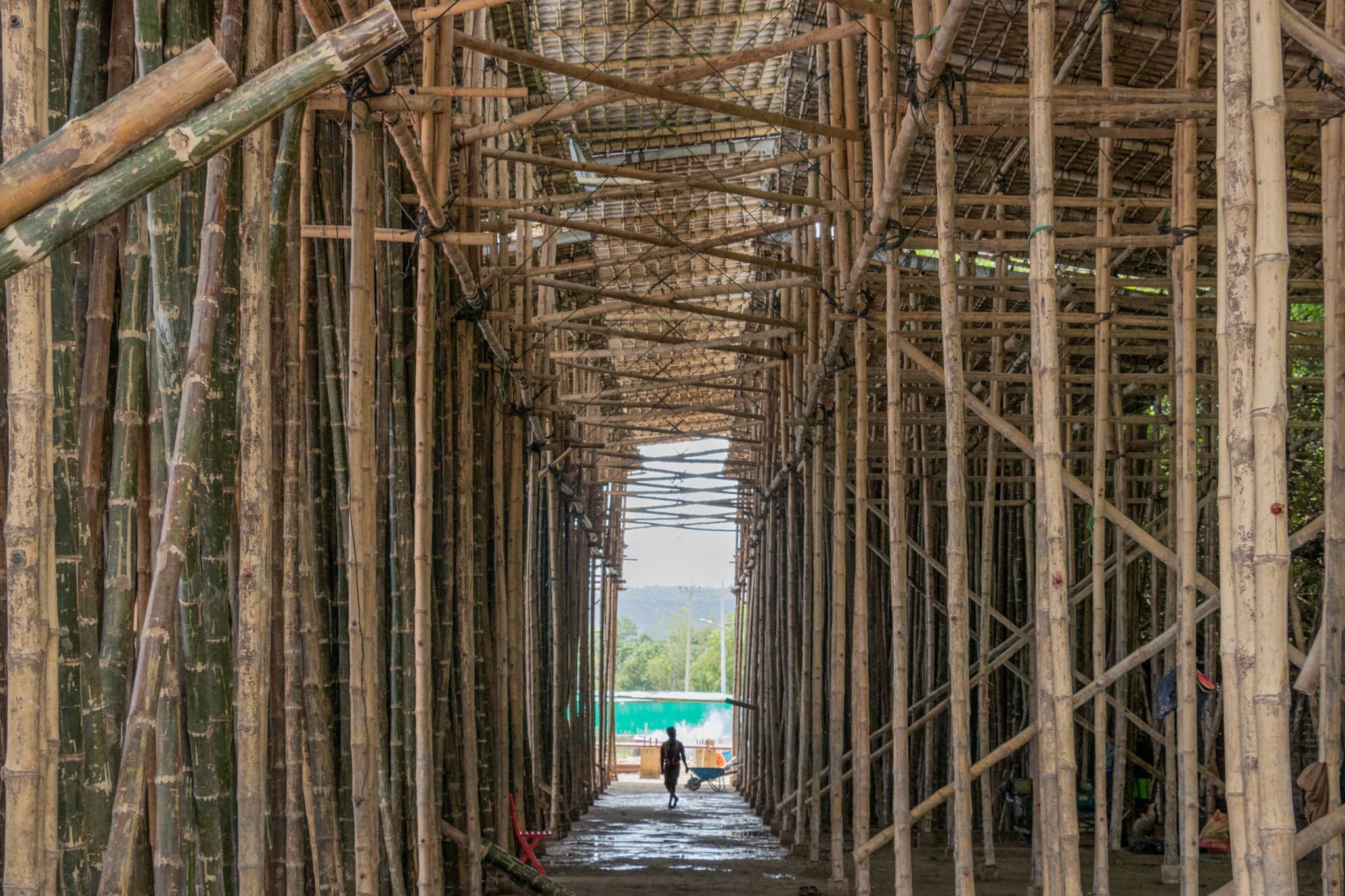
- admin
Autodesk Software Donation Supports IOM Design for Communities in Need

Designed using Autodesk software, IOM’s Bamboo Treatment Facility in Cox’s Bazar, Bangladesh enhances the quality of bamboo building materials, making shelters stronger and safer, to support the Rohingya refugee response. Photo: IOM/ Nate Webb.
Autodesk recently donated 3.2 million USD in software licenses to IOM through its Technology Impact Program, enabling enhanced design capability and operational support for communities in need. The licenses are instrumental in advancing IOM shelter and settlements initiatives globally.
The in-kind contribution consists of hundreds of licenses from the Autodesk Architecture Engineering & Construction Collection. This is the largest donation since the IOM – Autodesk partnership began in 2018. The donation is made possible through collaboration of Autodesk with USA for IOM, IOM’s nonprofit partner in the United States.
The Autodesk software licenses significantly boost IOM’s operational and design capacity to support the delivery of humanitarian programs across more than 30 countries, where more than 200 IOM staff are using Autodesk products; expansion in programming has necessitated additional licenses.
“The private sector offers unique expertise and resources and has an essential role to play in tackling humanitarian challenges. Partnerships with the private sector are key to forward innovation in our efforts to drive solutions to displacement,” said Luciano Arroio, USA for IOM Head of Operations.
“The Autodesk contribution supports the timely and safe delivery of assistance to migrants and displaced populations worldwide and facilitates expansion of IOM’s operational and technical capacity.
IOM staff rely on Autodesk software in planning and implementation of construction projects, including Shelter and Settlements programming; Water, Sanitation and Hygiene (WASH), Camp Coordination and Camp Management (CCCM) and for disaster risk management. Autodesk tools support staff to design safe and sustainable shelters, improve mapping and design quality, and facilitate communication between project stakeholders.
In Bangladesh, where IOM leads site planning in camps supporting Rohingya refugees in Cox’s Bazar, Autodesk tools contribute to site and infrastructure development for effective humanitarian response.
In Ukraine, IOM Shelter & Housing Unit staff use Autodesk software on a daily basis to facilitate rehabilitation and construction projects for internally displaced persons.
In addition to the donated licenses, IOM received hands on support from Autodesk through collaboration on the delivery of technical training in humanitarian site planning.
For more information please contact:
Email: info@usaforiom.org

An Isolation and Treatment Center, designed by IOM using Autodesk software, constructed in a camp in Cox’s Bazar, Bangladesh, supports health care in the Rohingya refugee response. Photo: IOM/ Abdullah Al Mashrif

- admin
A letter from our CEO Maria Moreno - A Grateful Goodbye: Celebrating Our Achievements Together

Dear reader,
As I conclude my tenure at USA for IOM, I want to express my profound gratitude for the opportunity to contribute to and lead our organization during a period of significant transformation over the past 12 years. I am immensely proud of what we have achieved together.
Facilitated by your generosity, this organization that we have developed together has grown beyond what we could imagine, expanding our reach to assist and impact vulnerable people and migrants around the globe.
We have mobilized action to support numerous impactful projects driven by IOM, from responding to humanitarian crises in various countries to fostering entrepreneurship among migrants and local communities, and supporting victims of human trafficking. Our programs have not only facilitated recovery but have also built resilience across communities.
Our commitment to excellence is further demonstrated by our dedication to transparency, accountability, and effective governance. The organization has earned recognition for its compliance and transparency, enhancing trust and support from our donors, funders, and partners. This has been crucial in ensuring the sustainability and ongoing positive impact of our work, positioning us as a leader in the nonprofit sector.
As I step down from my role today, I am confident that USA for IOM will continue to achieve new heights. Our dedicated Board of Directors and Staff are committed to advancing our mission, highlighting critical migration issues, and mobilizing support that yields tangible improvements in the lives of migrants.
I am grateful for the exceptional partnership with the International Organization for Migration (IOM-UN Migration). Looking forward to, USA for IOM will continue to support IOM and Director General Amy Pope’s vision to position migration as a catalyst for human development and global prosperity.
I will continue to be an advocate for people on the move, as we together create opportunities for migrants, refugees, and those in crisis, to build on the promise of migration. The importance of addressing migration issues has never been more critical.
Thank you for your support and collaboration throughout my journey with USA for IOM.
Best regards,
Maria Moreno

Best regards,
Maria Moreno

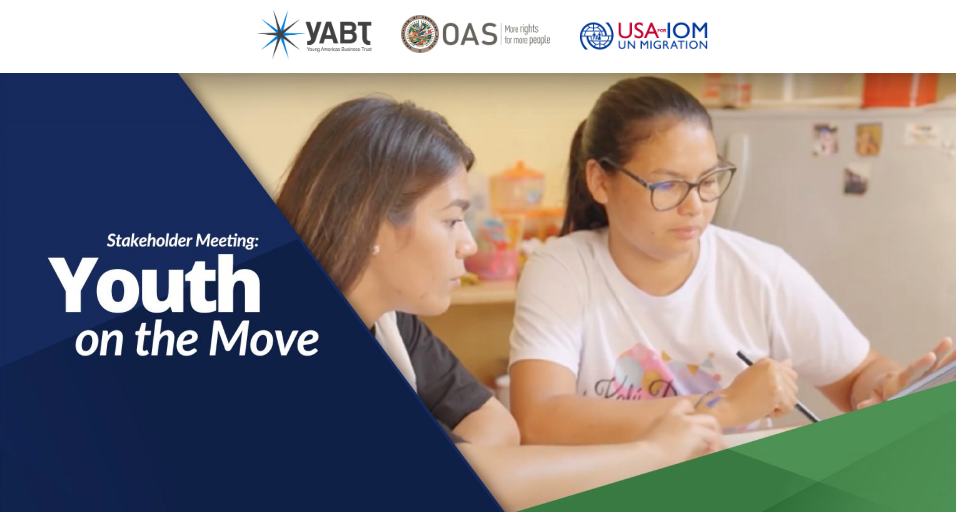
- admin
Entrepreneurship as Opportunity to Integrate Migrant Youth Highlighted at Key Stakeholder Roundtable
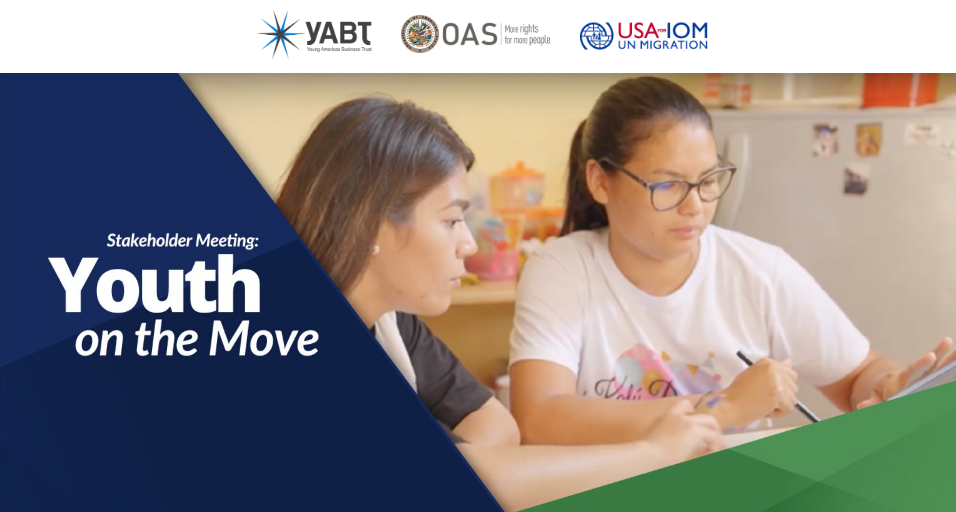
Young migrant entrepreneurs sat with key stakeholders during a roundtable in Washington D.C., today and addressed the value of strengthening the entrepreneurial capacity of migrants and young people to build more socio-economically resilient communities.
Participants emphasized the powerful impact that entrepreneurship programs have had in integrating young people into communities in Latin America and the Caribbean and enhancing their economic productivity. Both public and private sector representatives offered ideas on their participation to expand regional entrepreneurial programming for migrants and host communities.
“Entrepreneurship, in addition to an economic opportunity, is an educational experience, a tool in youth’s survival tool kit. Through entrepreneurship talent moves freely, as young, global-minded individuals contribute to the creation of a barrier-free world through their endeavors,” said Federico Arellano, a young entrepreneur from Mexico now based in Canada, who began Pitch Jams, a software company that allows a worldwide exchange of ideas.
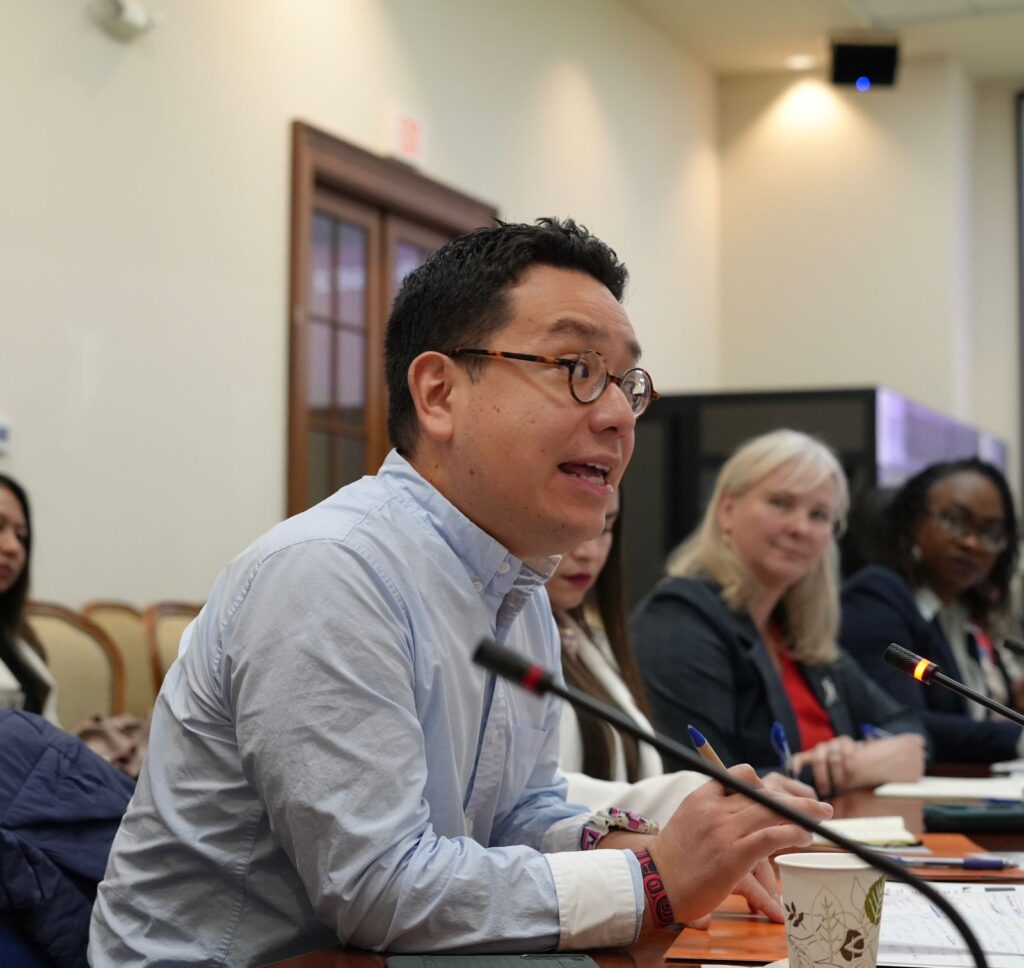
Roundtable participants included representatives of civil society, multilateral banks, agencies, foundations, private sector, the Summit of the Americas secretariat and Permanent Missions to the Organization of American States (OAS) and development community actors. This Roundtable event titled “Youth on the Move: Youth Entrepreneurship as a Tool for Socio-Economic Integration of Migrants and Refugees”, was organized by the Young Americas Business Trust (YABT) and USA for IOM.
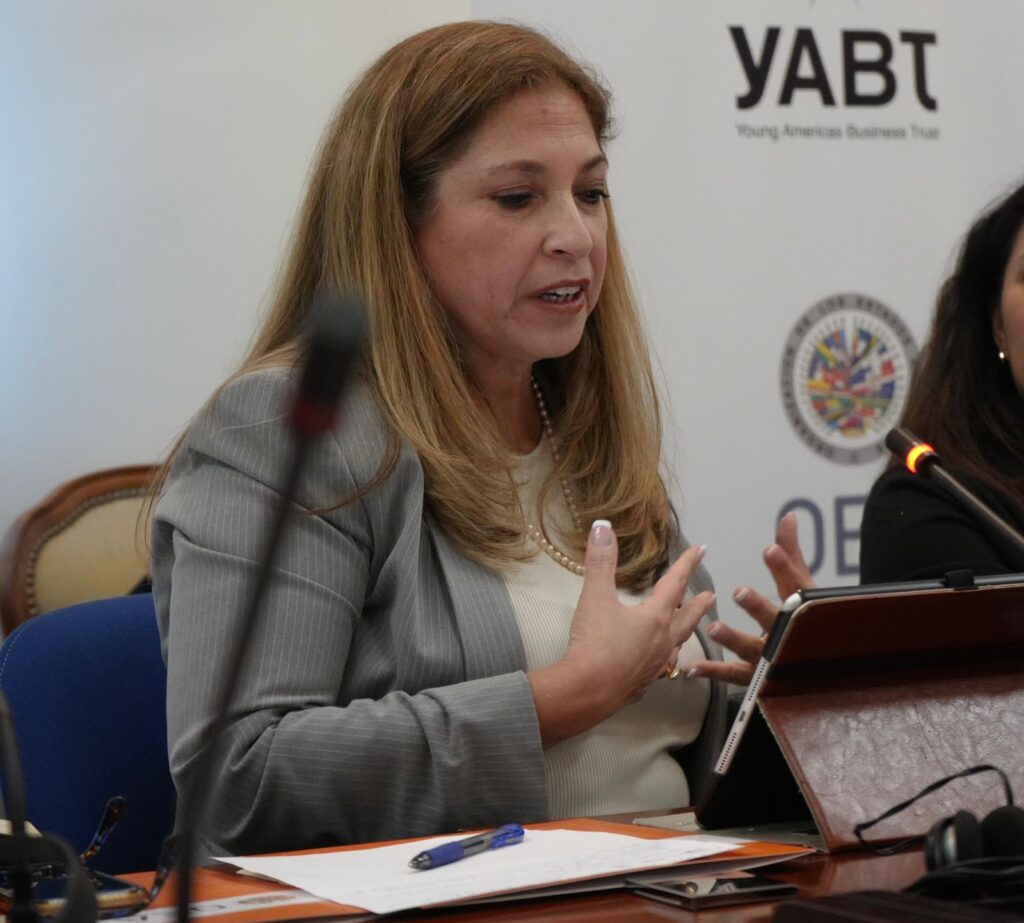
“We embrace the invaluable role and engagement of youth as strategic partners in the Summits Process. By actively involving you – the youth in our endeavors, we pave the way for a profound impact that extends to all corners of our hemisphere. Together, we embark on a journey of collaboration, planting the seeds of partnerships that hold the promise of blossoming into collective efforts,” said María Celina Conte, Director of the Summits of the Americas Secretariat, OAS, who opened the session.
“Youth entrepreneurship initiatives have proven positive impacts on youths and communities to spur growth and investment,” said Luis Viguria, CEO of Young Americas Business Trust. “This holds true in programming with young migrant entrepreneurs, who can use their unique talents to benefit their new communities.
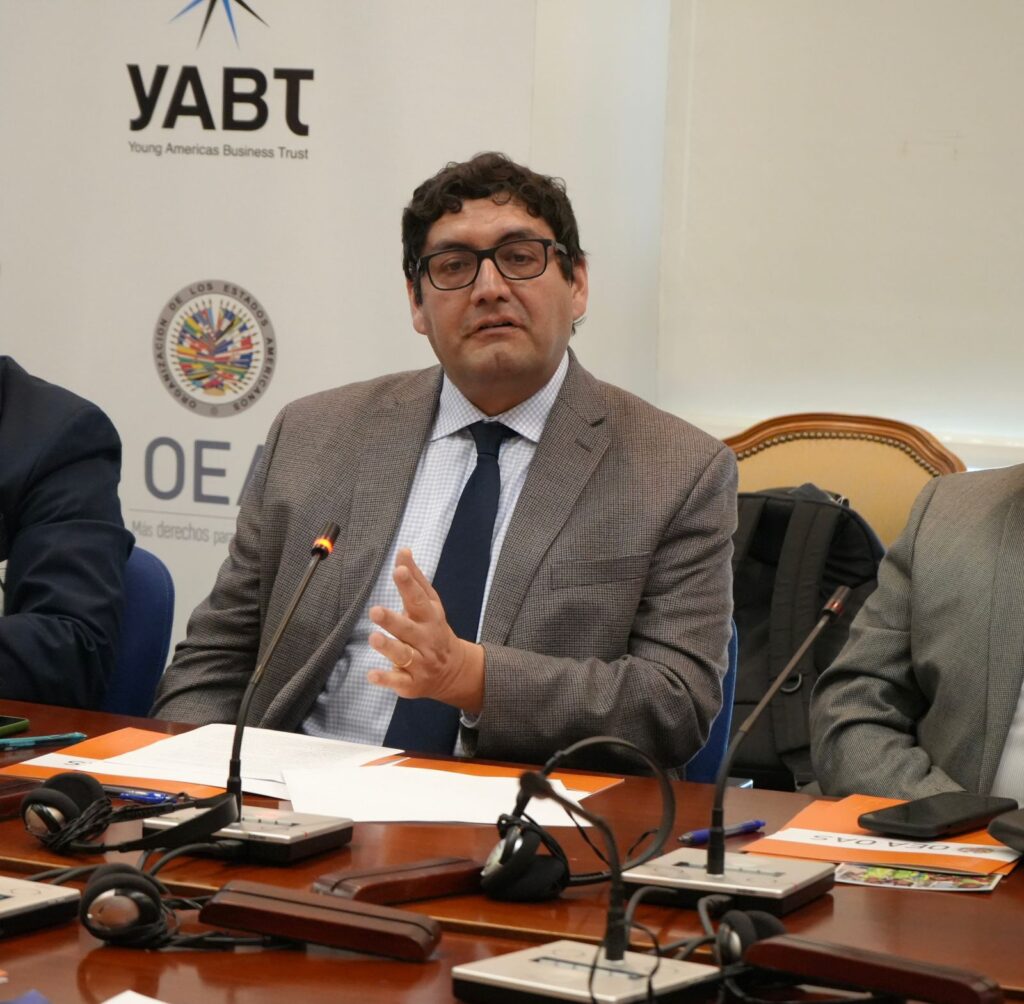
The roundtable discussion explored enhancing strategy, programming and partnerships for development, with aim to incorporate migrants and refugees into local economies, thereby sharing knowledge and skills and creating new market opportunities and cross-border networks. Participants also highlighted how entrepreneurship can directly contribute to addressing the consequences of large movements of forcibly displaced people.
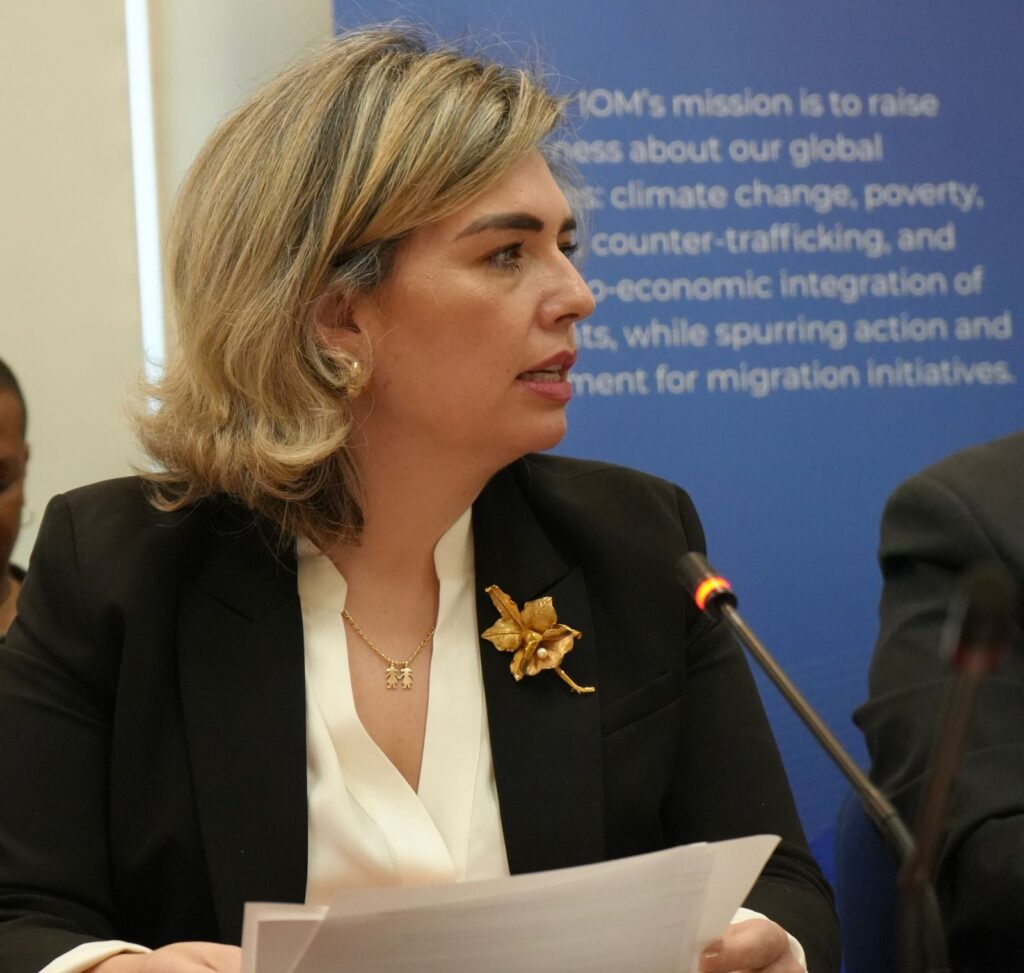
“Collaboration across sectors is essential to enhance the impact of efforts to promote economic opportunities for migrant populations,” said María Moreno, CEO of USA for IOM. “Investment in entrepreneurship has great potential to accelerate the integration of migrants in host communities and create long-term solutions.”
Discussion moderator Francisco Martínez, IOM Economic Reintegration Officer, emphasized the importance of reinforcing the technical capacities and soft skills of migrants to facilitate their entrepreneurial endeavors and integration.
The discussions fostered stronger linkages between the migrant community and the upcoming Young Americas Forum at the 2024 Summit of the Americas. This alignment is facilitated through support of both the public and private sectors.
Economic opportunities for migrant populations are critical to support livelihoods and contribute to host communities. This holds true in the Americas, as following the crisis in Venezuela, 7.7 million Venezuelan migrants and refugees are living outside their country; more than 6.5 million Venezuelans reside in Latin America and the Caribbean.
USA for IOM and YABT are organizing the “Innovation Challenge: Youth on the Move” a regional innovation competition that will provide financial skills training, opportunities for seed capital and will identify, support, and accelerate innovative ideas and new business models driven by young people. The competition and training offered aim to strengthen host communities of the Venezuelan migrant, refugee, and displaced population in Ecuador, Dominican Republic and Peru, for this first edition of the program.
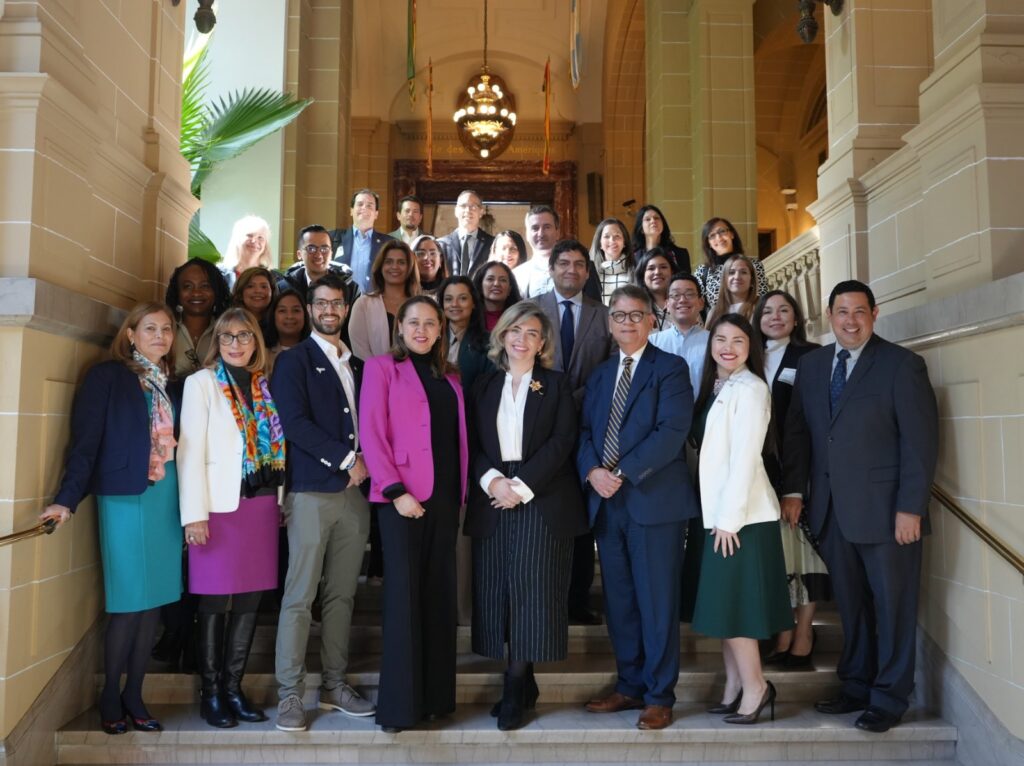
For more information, please contact:
Edgar Maestre at YABT: edgar.maestre@yabt.net
Luciano Arroio at USA for IOM: larroio@iom.int
Photos: © USA for IOM, by Liliana Serrano @ Serrano Studios DC





